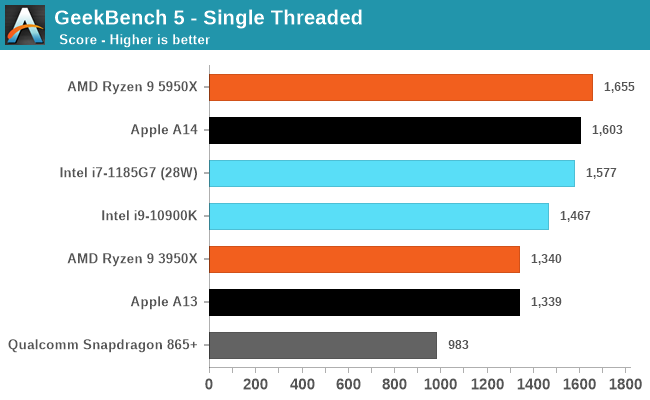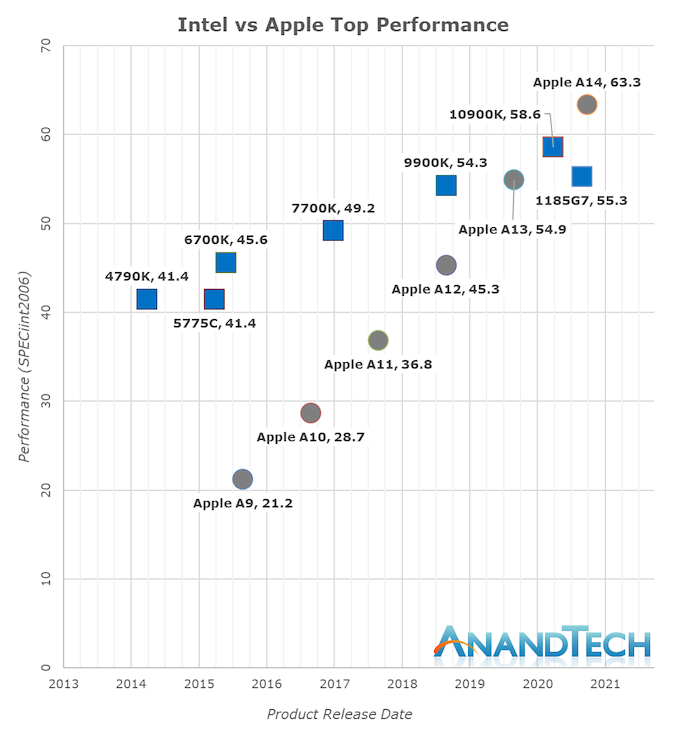Apple Announces The Apple Silicon M1: Ditching x86 - What to Expect, Based on A14
by Andrei Frumusanu on November 10, 2020 3:00 PM EST- Posted in
- Apple
- Apple A14
- Apple Silicon
- Apple M1
From Mobile to Mac: What to Expect?
To date, our performance comparisons for Apple’s chipsets have always been in the context of iPhone reviews, with the juxtaposition to x86 designs being a rather small footnote within the context of the articles. Today’s Apple Silicon launch event completely changes the narrative of what we portray in terms of performance, setting aside the typical apples vs oranges comparisons people usually argument with.
We currently do not have Apple Silicon devices and likely won’t get our hands on them for another few weeks, but we do have the A14, and expect the new Mac chips to be strongly based on the microarchitecture we’re seeing employed in the iPhone designs. Of course, we’re still comparing a phone chip versus a high-end laptop and even a high-end desktop chip, but given the performance numbers, that’s also exactly the point we’re trying to make here, setting the stage as the bare minimum of what Apple could achieve with their new Apple Silicon Mac chips.

The performance numbers of the A14 on this chart is relatively mind-boggling. If I were to release this data with the label of the A14 hidden, one would guess that the data-points came from some other x86 SKU from either AMD or Intel. The fact that the A14 currently competes with the very best top-performance designs that the x86 vendors have on the market today is just an astonishing feat.
Looking into the detailed scores, what again amazes me is the fact that the A14 not only keeps up, but actually beats both these competitors in memory-latency sensitive workloads such as 429.mcf and 471.omnetpp, even though they either have the same memory (i7-1185G7 with LPDDR4X-4266), or desktop-grade memory (5950X with DDR-3200).
Again, disregard the 456.hmmer score advantage of the A14, that’s majorly due to compiler discrepancies, subtract 33% for a more apt comparison figure.

Even in SPECfp which is even more dominated by memory heavy workloads, the A14 not only keeps up, but generally beats the Intel CPU design more often than not. AMD also wouldn’t be looking good if not for the recently released Zen3 design.

In the overall SPEC2006 chart, the A14 is performing absolutely fantastic, taking the lead in absolute performance only falling short of AMD’s recent Ryzen 5000 series.
The fact that Apple is able to achieve this in a total device power consumption of 5W including the SoC, DRAM, and regulators, versus +21W (1185G7) and 49W (5950X) package power figures, without DRAM or regulation, is absolutely mind-blowing.

There’s been a lot of criticism about more common benchmark suites such as GeekBench, but frankly I've found these concerns or arguments to be quite unfounded. The only factual differences between workloads in SPEC and workloads in GB5 is that the latter has less outlier tests which are memory-heavy, meaning it’s more of a CPU benchmark whereas SPEC has more tendency towards CPU+DRAM.
The fact that Apple does well in both workloads is evidence that they have an extremely well-balanced microarchitecture, and that Apple Silicon will be able to scale up to “desktop workloads” in terms of performance without much issue.
Where the Performance Trajectory Finally Intersects
During the release of the A7, people were pretty dismissive of the fact that Apple had called their microarchitecture a desktop-class design. People were also very dismissive of us calling the A11 and A12 reaching near desktop level performance figures a few years back, and today marks an important moment in time for the industry as Apple’s A14 now clearly is able to showcase performance that’s beyond the best that Intel can offer. It’s been a performance trajectory that’s been steadily executing and progressing for years:
Whilst in the past 5 years Intel has managed to increase their best single-thread performance by about 28%, Apple has managed to improve their designs by 198%, or 2.98x (let’s call it 3x) the performance of the Apple A9 of late 2015.
Apple’s performance trajectory and unquestioned execution over these years is what has made Apple Silicon a reality today. Anybody looking at the absurdness of that graph will realise that there simply was no other choice but for Apple to ditch Intel and x86 in favour of their own in-house microarchitecture – staying par for the course would have meant stagnation and worse consumer products.
Today’s announcements only covered Apple’s laptop-class Apple Silicon, whilst we don’t know the details at time of writing as to what Apple will be presenting, Apple’s enormous power efficiency advantage means that the new chip will be able to offer either vastly increased battery life, and/or, vastly increased performance, compared to the current Intel MacBook line-up.
Apple has claimed that they will completely transition their whole consumer line-up to Apple Silicon within two years, which is an indicator that we’ll be seeing a high-TDP many-core design to power a future Mac Pro. If the company is able to continue on their current performance trajectory, it will look extremely impressive.











644 Comments
View All Comments
mdriftmeyer - Saturday, November 14, 2020 - link
The word is deprecated, not depreciated.Zerrohero - Friday, November 13, 2020 - link
”no upgrade or servicing or any reuse/recycling at all, extremely bad for environment.”Apple does repair MacBooks, including battery replacements. Apple recycles your Apple products for free.
I’m pretty sure that the average lifespan of a MacBook isn’t any shorter than it is for Windows laptops.
Also, Mac volumes are way, way smaller.
If you truly care about the environment, think of the Windows laptops and especially Android phones and their ridiculously short SW support. They are filling the landfills, not Apple products.
I’m also pretty sure that your interest in the environment strangely stops at Apple. Do you eat meat? Do you drive a car? Do you ever fly?
By the way, take a look at Greenpeace’s Green Electronics Rankings. Care to guess which brand is number one of all the big names?
Hint: it starts with an A.
Tomatotech - Friday, November 13, 2020 - link
I don't have a link to hand, but I've seen figures indicating that Apple devices are used for approx 3x longer than Windows devices. Comparing the used prices for Android phones vs iPhones, Macbooks vs Windows laptops, seems to bear this out.A 5 year old 2015 Macbook Pro still fetches high prices, but try selling a 5-year old Windows laptop...
This indicates that the daily use base of Apple laptops could be 2x to 3x higher as a proportion of total laptop daily use than their sales figures indicate.
(That's consumer market only. For business many staff suffer using 5-10 year old windows desktops and laptops that won't get replaced till they break down.)
Oxford Guy - Sunday, December 6, 2020 - link
"A 5 year old 2015 Macbook Pro still fetches high prices"Because it's the last one with a good keyboard and no need for dongle hell?
Oxford Guy - Sunday, December 6, 2020 - link
Also, it has MagSafe and no T2, afaik.ex2bot - Friday, November 13, 2020 - link
Stick with Microsoft and Google. They’re pro-consumer. They love you. They want what’s best for you, not just your money. They’re your corporate mommy. Embrace the sweet, sweet Windows ecosystem (and Android, too) that’s made to nurture you. Because they care about you. They love you and are proud of you. Momma Microsoft. Papa Google.ex2bot - Friday, November 13, 2020 - link
(Some of the above may be /s.)GeoffreyA - Saturday, November 14, 2020 - link
Well, we're living in Brave New World almost. For my part, *all* these companies are rotten eggs. Their job is to make money out of us, so whatever they do is shaped to that end. How kind soever their words are, no matter how sweet, it's with a motive. I think the ones I hate the most are Google and Facebook. Don't be evil indeed. When the dollars start rolling into Mountain View's coffers, when the immoral power over people's lives grows, then it's "do the right thing."I won't defend Microsoft either. I grew up with Windows, so will always have a fondness for it, but Microsoft went off the tracks from the Windows 8 era. As for Apple, I just don't like them. Perhaps it's how they paint themselves as this big humane company, of great heart and greater ideals---but at the bottom, what is it all about? They're just making money, and a lot of it too. Apple's products are not cheap. And I'd say, Microsoft is impotent and too silly: Apple is the one to be alarmed about. They've got genius and a relentless focus, and worst of all, a despotic streak running through them.
Oxford Guy - Sunday, December 6, 2020 - link
"For my part, *all* these companies are rotten eggs."Corporations are soulless non-living financial inventions. They're designed to have no morality so amoral behavior on the part of the owners' class can be rationalized away.
They are financial shields against culpability. The Justice Department, according to insiders on MSNBC, has long had a policy of finding corporations instead of jailing executives when laws are broken.
Oxford Guy - Sunday, December 6, 2020 - link
fining, not "finding"